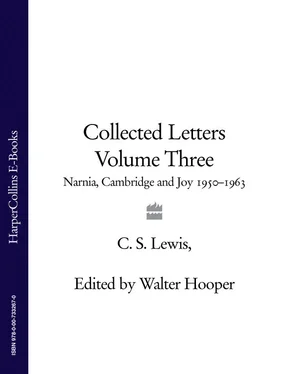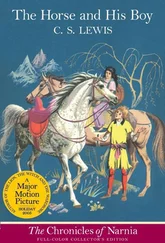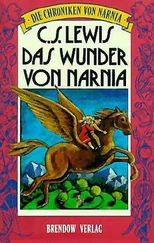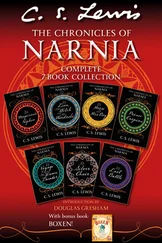While you are leaving a trail of golden dollars across Europe is perhaps hardly a tactful moment to talk about another holiday; but we do both hope that meeting you is but a pleasure postponed, and that another year you will venture to England again, and this time penetrate as far as Oxford.
With all best wishes to you both from us both,
yours,
W. H. Lewis
C. S. Lewis *
TO JOHN ROWLAND (TEX): TS
52/213.
Magdalen College,
Oxford.
23rd October 1952.
Dear Rowland,
(Let’s drop the honorifics on both sides). November 3rd. would be best. I’ll wait for you in the College lodge about 1.10.
Yours,
C. S. Lewis
TO THE EDITOR OF THE CHURCH TIMES (EC): 229
Magdalen College,
Oxford.
Sir,–
I am, like Mr Eric Pitt, 230 a layman, and would like to be instructed on several points before the proposal to set up a ‘system’ of Anglican canonization is even discussed. According to the Catholic Encyclopaedia , ‘saints’ are dead people whose virtues have made them ‘worthy’ of God’s ‘special’ love. 231 Canonization makes dulia 232 ‘universal and obligatory’; and, whatever else it asserts, it certainly asserts that the person concerned ‘is in heaven’.
Unless, then, the word ‘canonization’ is being used in a sense distinct from the Roman (and, if so, some other word would be much more convenient), the proposal to set up a ‘system’ of canonization means that someone (say, the Archbishops) shall be appointed
(a.) To tell us that certain named people are (i) ‘in heaven’, and (ii) are ‘worthy’ of God’s ‘special’ love.
(b.) To lay upon us (under pain of excommunication?) the duty of dulia towards those they have named.
Now it is very clear that no one ought to tell us what he does not know to be true. Is it, then, held that God has promised (and, if so, when and where?) to the Church universal a knowledge of the state of certain departed souls? If so, is it clear that this knowledge will discern varying degrees of kinds of salvation such as are, I suppose, implicit in the word ‘special’? And if it does, will the promulgation of such knowledge help to save souls now in viâ? . For it might well lead to a consideration of ‘rival claims’, such as we read of in the Imitation of Christ (Bk. Ill, ch. lvii), where we are warned, ‘Ask not which is greater in the kingdom of heaven…the search into such things brings no profit, but rather offends the saints themselves.’
Finally, there is the practical issue: by which I do not mean the Catholic Encyclopaedia’s neat little account of ‘the ordinary actual expenses of canonization’ (though that too can be read with profit), but the danger of schism. Thousands of members of the Church of England doubt whether dulia is lawful. Does anyone maintain that it is necessary to salvation? If not, whence comes our obligation to run such frightful risks?
C. S. Lewis
TO J. O. REED (P): 233
[Magdalen College
27 October 1952]
Dear Reed
Wd. this interest you? 234 Mastership at W. would, I think , be a pretty good springboard for any academic job that turned up, and, I know , a very good springboard for any other schoolmastering job. It is just possible you might increase your academic chances by sticking to research & not flirting with school jobs–I’m not sure. On the other hand, the W. job wd. be a safety device in case no academic job is attained. The President might have good advice to give on the question of policy. 235
Yours
C. S. Lewis
TO VERA GEBBERT (W): TS52/103.
Magdalen College,
Oxford.
28th October 1952.
Dear Gebberts,
Yes indeed, the whole parcel arrived intact, and I’m sorry that I did not make it clear that we had got your beautiful scarves (and the cigarettes) as well as the whiskey; and when the two latter gifts are, alas, nothing but a fragrant memory, we shall still be enjoying the scarves–which can be used with comfort for about nine months in the English year, as you can well imagine, after your disastrous experience. It is very welcome news that you are through your troubles, and are enjoying yourselves in Munich; it must be a great treat for Mr. Gebbert to have such a reunion after so many years. What you have to say about the re-building is very interesting: but I hope there is not going to be a political rebuild. Our papers are carrying an unpleasant story of a get together party of old concentration guards, anti-allied speeches, shouts of ‘Swinehound Eisenhower’ etc.
I’m sorry to say our Vera–may I say our other Vera?–so far from being better, has developed pneumonia, and is now in a nursing home; she is going along satisfactorily, but we are still not without anxiety about her. Largely her own fault, for she has since confessed that she had been feeling ill for at least a week before she took to her bed. Like all people who normally have perfect health, she is not a good patient, which I fear will retard her recovery.
We shall think of you next week on your way back to your own land, with, I hope, happy memories of the trip: and taking with you our hopes that you will repeat it in the not too distant future.
All good luck.
Yours sincerely,
W. H. Lewis
C. S. Lewis
TO PHOEBE HESKETH (W):
Magdalen College,
Oxford
Oct 29th 1952
Dear Mrs. Hesketh
Surely I didn’t say that ‘really good’ poetry was not painful (which wd. make Lear not really good), but that the very best and certainly rarest kind of all was not painful? 236
I hope very much you will come and see me when you are in Oxford. I have just given The Quenchless Flame a first reading. I predict it will grow either shorter or longer before it reaches its final form, but it is full of good things. The leaf escaping from the bondage of the tree at the v. beginning wins one’s good will for the whole poem. The six lines beginning ‘Consider beauty’ are particularly good.
Yours sincerely
C. S. Lewis
TO MARG-RIETTE MONTGOMERY (W): TS
REF.52/248.
Magdalen College,
Oxford.
1st November 1952.
Dear Miss Montgomery,
It would be a bit hard to believe in Our Lord without believing in the Father, seeing that Our Lord spent most of his time talking about the Father. Also God.
Yours sincerely,
C. S. Lewis
TO JOHN ROWLAND (TEX): TS
52/213.
Magdalen College,
Oxford.
6th November 1952.
My dear Rowland,
There was no need at all to write, but it was nice of you to do so. I don’t forsee being in Brighton, but will certainly look you up if I am. No addresses to Literary Groups though!
Yours,
C. S. Lewis
TO MRS JOHNSON (W): 237
Magdalen etc,
Oxford.
Nov. 8 1952
Dear Mrs. Johnson
I am returning your letter with the questions in it numbered so that you’ll know wh. I am answering.
(1.) 238 Some call me Mr . and some Dr . and I not only don’t care but usually don’t know which.
(2.) 239 Distinguish (A) A second chance in the strict sense, i.e. a new earthly life in which you cd. attempt afresh all the problems you failed at in the present one (as in religions of Re-Incarnation). (B) Purgatory: a process by which the work of redemption continues, and first perhaps begins to be noticeable after death. I think Charles Williams depicts B, not A.
(3.) 240 We are never given any knowledge of ‘What would have happened if…’
(4.) 241 I think that every prayer which is sincerely made even to a false god or to a v. imperfectly conceived true God, is accepted by the true God and that Christ saves many who do not think they know Him. For He is (dimly) present in the good side of the inferior teachers they follow.
Читать дальше












